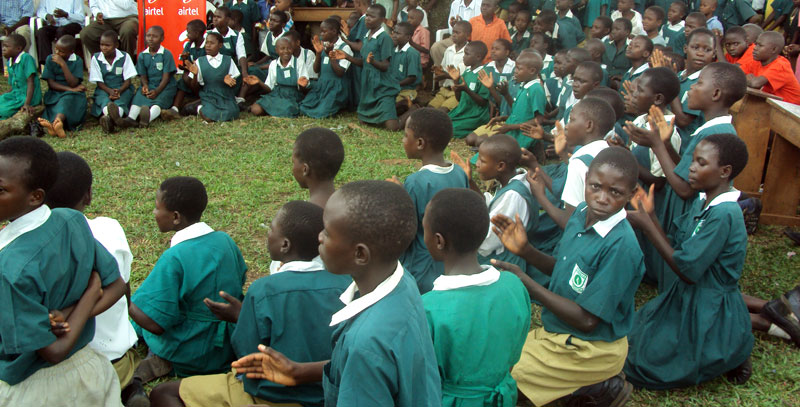Analysis
Why Subject Teachers to Primary Exams
MP blasts district Council for forcing teachers to sit exams
A resolution that was passed about a week ago by Nakaseke District Council to subject all Primary Level Teachers in the district to sit competence exams has sparked heated debate from different sections of the population on what ought to be done to turn around the declining performance of mostly rural schools at primary level.
But the resolution has attracted fierce resistance from different sections of the population, most notably from the district woman Member of Parliament (MP) Sarah Najjuma who says the councillors have chosen the wrong approach to address the poor state of PLE schools in the district.
According to Dissan Lwanga, a councillor in Nakaseke district council and one of the key backers of the resolution, says the move was sparked by the desire by the district leadership to hold teachers accountable by assessing the competences as well as the legality of all teachers in the district.
“It is not possible that all the children in a district are stupid or weak. Failing is normal but having hundreds of failures in a single district is a point of concern and calls for some intervention,” Lwanga argued.
Moreover, Lwanga argues, the move was triggered by numerous recommendations and observations that were made by headteachers who were demoted by the ministry over poor performance by their students in PLE.
“We are simply implementing recommendations that we have found in numerous reports by many headteachers who have been demoted from their positions on grounds of poor grades in their schools.
Remember there is a policy by government that headteachers whose pupils perform poorly in PLE, are demoted from their administrative roles back to teaching,” Lwanga adds: “Most of the headteachers have blamed teachers in their schools are being the source of their poor performance. This is why we decided to honour the Chairman’s request for funds of UGX 5million to assess the teachers.”
Lwanga argues that the assessment will not only subject all primary teachers in government schools in the district to exams, but will also help them to validate and verify all teachers. The validation and verification process, according to Lwanga, is aimed at weeding out ghost and unqualified teachers respectively.
“If you’re not qualified as a teacher, or you got your papers from Nasser road (meaning fake) the process will automatically kick you out,” Lwanga noted, pointing out that they have received many complaints indicating that most teachers in government schools think they are not accountable to the school administration and as a result, they cut classes and often shrug off attempts to face disciplinary action over absenteeism or non performance.
The district’s move comes at a time when reports have emerged indicating that more than 50,000 PLE students failed in last year’s UNEB exams.
Several reports including by the World Bank have raised the red flag over absenteeism in most public schools especially in rural schools where teachers, it is reported, spend nearly half their time in class and the rest of their time doing private businesses such as engaging in trade like buying grain or riding boda bodas.
Alternative view
But MP Najjuma argues that poor performance in most PLE schools is a result of failure by all stakeholders in the system to fulfil their responsibilities and not simply the failure of teachers alone.
“Improving education needs involving all stakeholders including us legislators, parents and teachers themselves. We still have parents who don’t provide food to their children. How do you expect a teacher to handle such a hungry child in class?” Najjuma added.
“Teachers are public servants who were scrutinized and employed by the District Service Commission. If the politicians at the district claim they are incompetent, then all civil servants in the district employed by the DSC are equally not competent,” she added.
Najjuma says that poor performance of schools in the district is largely a result of of other factors such as lack of enough structures, which the district has not addressed yet.
“There are schools running from P1 to P7 in Nakaseke with four classrooms accommodating all the seven classes and holding the office and staff room. How do you expect a teacher to excellently teach, or probably, pupils to learn in such an environment?” she asked.
Najjuma’s view appears to be backed, incidentally by several other people The Sunrise has spoken to, including the assistant district education officer for Gomba district Gerald Katongole.
Katongole observes that testing teachers in UNEB-like exams may be unfair to most teachers because most of them focus only on their specific sections of the curriculum for purposes of preparing lessons for their classes and not the entire primary curriculum.
“If a teacher is meant to teach primary one (P.1), they are expected to read and prepare for what the curriculum demands of a P.1 teacher. It is therefore possible that they lose competence in other aspects that are taught in P. 5 or P. 6.” “In other words, you don’t teach what you know but what the curriculum demands of you.”
Katongole, argues that the best way to address poor performance at PLE, besides improving logistical issues such as teacher pay and the learning environment, is to enforce adherence to the curriculum. He however remains sympathetic to Nakaseke’s idea of ‘waking up’ teachers who may be in slumber.
Salongo John Ssebulime, a parent as well as a member of the school management committee at Kawandisa Army Primary School in Mubende district argues that schools are what parents make them.
Ssebulime says that most parents abandoned their responsibilities concerning their children’s’ education by labelling PLE schools as ‘Museveni’s schools.’ In the process they have condemned their children and indeed society’s present and future to failure.
Ssebulime argues that most teachers in government schools are competent and can ably educate the children to excel but they are demoralised by poor pay and hostile working conditions. He adds however that the duty of ensuring teachers welfare is not the preserve of the government, but rather a joint venture in which parents have a greater stake.
“As a parent, I thing that most teachers are qualified and competent to ensure that the children pass. The problem is that they are poorly paid. Look at private schools, they excel not because teachers are more competent, but because they are better monitored.
“In fact,” he adds: “because of job security in government schools, you find that government attracts more qualified teachers than private schools. But the reason private schools perform better is that they are more closely monitored than in government schools,” argues Ssebulime.
Citing example from his Kawandisa Army School, Ssebulime where he serves as the chairman of the school management committee, he says they introduced a UGX 10,000 charge for every child every term which the management uses to motivate teachers who dedicate time and energy to ensuring that their pupils learn what they are supposed to learn.
“We monitor the teachers’ performance through our children. We introduced a system where teachers regularly assess children’s performance and sign in the child’s book.
We supplement this with impromptu visits to schools by members of the school management committee,” Ssebulime, adds: “If parents cared to provide requirements for their children in UPE the same way they do for private schools, the results would probably be better in UPE than in private schools. But you find that the parent sends the UPE child a week or more late compared to the one in private school.”
From the above voices therefore, Nakaseke district’s decision to subject teachers to tests may be well intentioned, but appears ill prepared.
As councillor Lwanga pointed out, the proposal has been ‘negatively received’ and hugely misunderstood and this perhaps stems from the fact that there has been sufficient participation by most of the key stakeholders to discuss the problem and come up with possible solutions.
And from Ssebulime’s view, the country appears ripe for a national dialogue that can help parents occupy their right position in the affairs of their children’s education not only in public schools but also in private schools. As Ssebulime has pointed out from experience strengthening public schools will lessen the economic burden of educating children that appears to have gone out of hand.
Comments




























